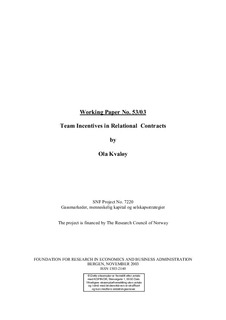| dc.contributor.author | Kvaløy, Ola | |
| dc.date.accessioned | 2006-06-28T07:15:33Z | |
| dc.date.available | 2006-06-28T07:15:33Z | |
| dc.date.issued | 2003-11 | |
| dc.identifier.issn | 1503-2140 | |
| dc.identifier.uri | http://hdl.handle.net/11250/165636 | |
| dc.description.abstract | Incentive schemes for teams are compared. I ask: under which conditions are relational incentive contracts based on joint performance evaluation, relative performance evaluation and independent performance evaluation self-enforceable. The framework of Che and Yoo (2001) on team incentives is combined with the framework of Baker, Gibbons and Murphy (2002) on relational contracts. In a repeated game between one principal and two agents, I find that incentives based on relative or independent performance are expected to dominate when the productivity of effort is high, while joint performance evaluation dominates when productivity is low. Incentives based on independent performance are more probable if the agents own critical assets. | en |
| dc.format.extent | 143756 bytes | |
| dc.format.mimetype | application/pdf | |
| dc.language.iso | eng | en |
| dc.publisher | SNF | en |
| dc.relation.ispartofseries | Working paper | en |
| dc.relation.ispartofseries | 2003:53 | en |
| dc.title | Team incentives in relational contracts | en |
| dc.type | Working paper | en |
